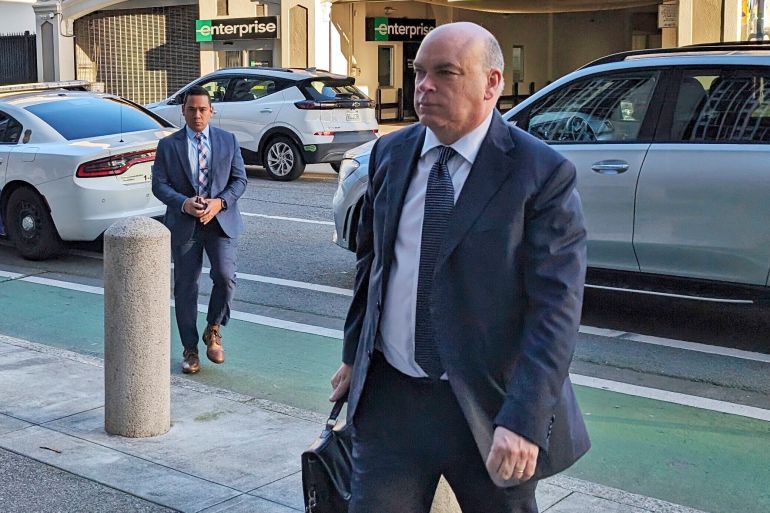Hewlett Packard to pursue $4bn claim against late tech mogul Mike Lynch
US tech company says it will continue case against Lynch’s estate following his death in a yacht wreck off Sicily.
British tech magnate Mike Lynch walks into federal court in San Francisco on March 26, 2024 [Michael Liedtke/AP]Published On 3 Sep 20243 Sep 2024
Hewlett Packard Enterprise (HPE) has confirmed that it will pursue $4bn in damages against the estate of tech mogul Mike Lynch following his death in a yacht wreck off the coast of Sicily.
HPE had sued Lynch and his former chief financial officer Sushovan Hussain for allegedly inflating the value of Autonomy before its acquisition for $11bn in 2011.
Keep reading
list of 4 itemsend of list
The Texas-based tech firm won a civil claim against Lynch at the United Kingdom’s High Court in 2022, although the judge said that any damages would be significantly less than the $5bn it had claimed.
“It is HPE’s intention to follow the proceedings through to their conclusion,” the company said in a statement on Monday.
Lynch, the founder of the software company Autonomy, died when his superyacht, the Bayesian, sank in a storm off the Italian island on August 19.
Six other people died in the sinking, including Lynch’s 18-year-old daughter.
Fifteen people survived, including Lynch’s wife Angela Bacares, who could now be liable for damages.
A little more than two months before his death, Lynch was acquitted of all 15 counts of fraud related to the sale of Autonomy at a criminal trial in San Francisco.
Lynch, who consistently denied any wrongdoing, said he was “elated” and “grateful” after the verdict in June.
“I am looking forward to returning to the UK and getting back to what I love most: my family and innovating in my field,” he said.
Lynch launched Autonomy in 1996 as a tool companies could use to pinpoint useful data from sources such as phone calls and emails.
Autonomy’s purchase in 2011 at the time ranked as the most expensive takeover of a British tech company on record.
HPE initially hailed its purchase of the company, but announced a $8.8bn writedown less than a year later after reporting that it had discovered “accounting misrepresentations”.
